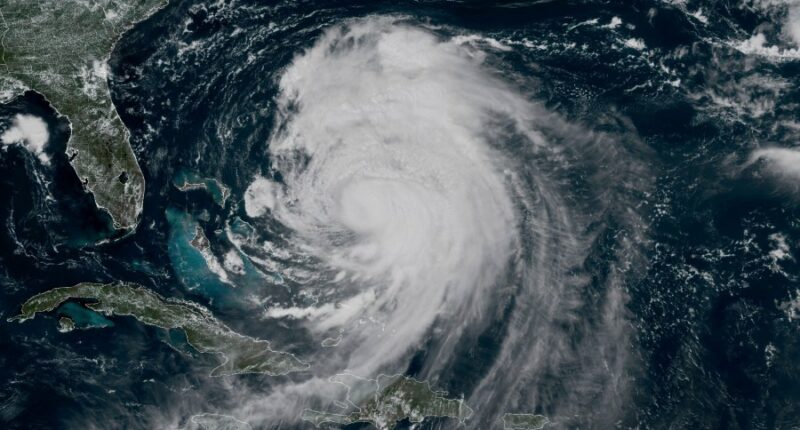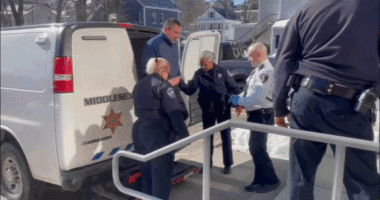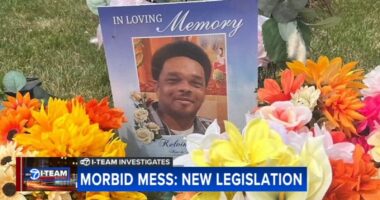Share this @internewscast.com

If a major hurricane approaches Central Florida this season, Maria knows it’s dangerous to remain inside her wooden, trailer-like home. In previous storms, she found refuge at her sister’s more robust house. If that wasn’t an option, she considered the shelter at the local high school as a last resort.
However, with increasing detentions and deportations of immigrants in her Apopka community, located 20 miles (32 kilometers) northwest of Orlando, Maria, a Mexican agricultural worker without permanent U.S. legal status, feels uncertain about these options. They all pose the risk of encountering immigration enforcement agents.
“They can go where they want,” said Maria, 50, who insisted The Associated Press not use her last name for fear of detention. “There is no limit.”
Natural disasters have always presented unique risks for individuals in the United States without permanent legal status. With the peak Atlantic hurricane season underway, immigrants and their supporters assert that President Donald Trump’s assertive immigration enforcement measures have amplified the danger.
Traditionally neutral spaces for immigrants, such as schools, hospitals, and emergency management agencies, are now viewed with suspicion. Advocates claim that local law enforcement’s collaboration with U.S. Immigration and Customs Enforcement increases their vulnerability, forcing a difficult choice between physical safety and avoiding detention.
“Am I going to risk the storm or risk endangering my family at the shelter?” said Dominique O’Connor, an organizer at the Farmworker Association of Florida. “You’re going to meet enforcement either way.”
For O’Connor and many immigrants, it’s about more than the storms. People without permanent legal status might face similar dilemmas in any situation where extreme heat, wildfires, or other severe weather could warrant evacuation, obtaining supplies, or even seeking medical attention.
Federal and state agencies have said little on whether immigration enforcement would be suspended in a disaster. It wouldn’t make much difference to Maria: “With all we’ve lived, we’ve lost trust.”
New policies deepen concerns
Efforts by Trump’s Republican administration to exponentially expand immigration enforcement capacity mean many of the agencies active in disaster response are increasingly entangled in immigration enforcement.
Since January, hundreds of law enforcement agencies have signed 287(g) agreements, allowing them to perform certain immigration enforcement actions. Most of the agreements are in hurricane-prone Florida and Texas.
Florida’s Division of Emergency Management oversees building the state’s new detention facilities, like the one called “Alligator Alcatraz” in the Everglades. Federal Emergency Management Agency funds are being used to build additional detention centers around the country, and the Department of Homeland Security temporarily reassigned some FEMA staff to assist ICE.
The National Guard, often seen passing out food and water after disasters, has been activated to support U.S. Customs and Border Protection operations and help at detention centers.
These dual roles can make for an intimidating scene during a disaster. After floods in July, more than 2,100 personnel from 20 state agencies aided the far-reaching response effort in Central Texas, along with CBP officers. Police controlled entry into hard-hit areas. Texas Department of Public Safety and private security officers staffed entrances to disaster recovery centers set up by FEMA.
That unsettled even families with permanent legal status, said Rae Cardenas, executive director of Doyle Community Center in Kerrville, Texas. Cardenas helped coordinate with the Mexican Consulate in San Antonio to replace documents for people who lived behind police checkpoints.
“Some families are afraid to go get their mail because their legal documents were washed away,” Cardenas said.
In Florida, these policies could make people unwilling to drive evacuation roads. Traffic stops are a frequent tool of detention, and Florida passed a law in February criminalizing entry into the state by those without legal status, though a judge temporarily blocked it.
There may be fewer places to evacuate now that public shelters, often guarded by police or requiring ID to enter, are no longer considered “protected areas” by DHS. The agency in January rescinded a policy of President Joe Biden, a Democrat, to avoid enforcement in places like schools, medical facilities and emergency response sites.
The fears extend even into disaster recovery. On top of meeting law enforcement at FEMA recovery centers, mixed-status households that qualify for help from the agency might hesitate to apply for fear of their information being accessed by other agencies, said Esmeralda Ledezma, communications associate with the Houston-based nonprofit Woori Juntos. “Even if you have the right to federal aid, you’re afraid to be punished for it,” Ledezma said.
In past emergencies, DHS has put out messaging stating it would suspend immigration enforcement. The agency’s policy now is unclear.
DHS Assistant Secretary Tricia McLaughlin said in an email that CBP had not issued any guidance “because there have been no natural disasters affecting border enforcement.” She did not address what directions were given during CBP’s activation in the Texas floods or whether ICE would be active during a disaster.
Florida’s Division of Emergency Management did not respond to questions related to its policies toward people without legal status. Texas’ Division of Emergency Management referred The Associated Press to Republican Gov. Greg Abbott’s office, which did not respond.
Building local resilience is a priority
In spite of the crackdown, local officials in some hurricane-prone areas are expanding outreach to immigrant populations. “We are trying to move forward with business as usual,” said Gracia Fernandez, language access coordinator for Alachua County in Central Florida.
The county launched a program last year to translate and distribute emergency communications in Spanish, Haitian Creole and other languages. Now staffers want to spread the word that county shelters won’t require IDs, but since they’re public spaces, Fernandez acknowledged there’s not much they can do if ICE comes.
“There is still a risk,” she said. “But we will try our best to help people feel safe.”
As immigrant communities are pushed deeper into the shadows, more responsibility falls on nonprofits, and communities themselves, to keep each other safe.
Hope Community Center in Apopka has pushed local officials to commit to not requiring IDs at shelters and sandbag distribution points. During an evacuation, the facility becomes an alternative shelter and a command center, from which staffers translate and send out emergency communications in multiple languages. For those who won’t leave their homes, staffers do door-to-door wellness checks, delivering food and water.
“It’s a very grassroots, underground operation,” said Felipe Sousa Lazaballet, the center’s executive director.
Preparing the community is challenging when it’s consumed by the daily crises wrought by detentions and deportations, Sousa Lazaballet said.
“All of us are in triage mode,” he said. “Every day there is an emergency, so the community is not necessarily thinking about hurricane season yet. That’s why we have to have a plan.”
___
Associated Press coverage of philanthropy and nonprofits receives support through the AP’s collaboration with The Conversation US, with funding from Lilly Endowment Inc. The AP is solely responsible for this content. For all of the AP’s philanthropy coverage, visit
















